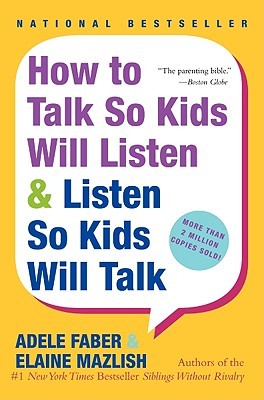The Best Parenting Book: A Review of “How to Talk So Kids Will Listen.

In my roles as a parent and as a psychologist, I have read many books on parenting. My favorite by far (I’ve read it 4 or 5 times) is Adele Faber and Elaine Mazlish’s How to Talk So Kids Will Listen & Listen So Kids Will Talk. The book is based on the work of famed child psychologist Haim Ginott, but it presents his ideas in a much more accessible and easy to apply format than Ginott’s own classic parenting book: Between Parent & Child.
How to Talk So Kids Will Listen presents an approach to “getting kids to listen” that assumes there is a “direct connection between how kids feel and how they behave.” Instead of enforcing cooperation through threats, scoldings, bribes, or punishments, authors Adele Faber and Elaine Mazlish believe that helping our children feel better is the best way to get them to behave better.
According Faber and Mazlish, we help our children to feel better by accepting and respecting their feelings. Denying our children’s feelings creates arguments, hostility, and poor cooperation between us and them. A major obstacle to accepting our children’s feelings, for most of us, is that our feelings weren’t accepted and respected as children. Our parenting instincts (derived from our experiences of being parented) frequently lead us unintentionally to deny our children’s feelings even when we’re trying to help them feel better.
While Faber and Mazlish do describe effective strategies for engaging cooperation without yelling, threats, or punishments, How to Talk So Kids Will Listen is actually about much more than just “getting kids to listen.” It presents an overall approach to parenting that is based upon mutual respect in the parent-child relationship. The book is full of specific strategies and skills illustrated by easy to follow examples: Chapter 1 “Helping Children Deal with Their Feelings,” Chapter 2 “Engaging Cooperation,” Chapter 3 “Alternatives to Punishments,” Chapter 4 “Encouraging Autonomy,” Chapter 5 “Praise”, and Chapter 6 “Freeing Children from Playing Roles.”
Faber and Mazlisch believe that parents who demonstrate acceptance, respect and skill in their interactions with their children will raise confident, respectful, independent, responsible, and emotionally intelligent people who know how to resolve differences with others effectively.
I want to add a plug from my new book: Challenging Boys: A Proven Plan for Keeping Your Cool and Helping Your Son Thrive which is available now on Amazon. (Click this link to order.) In Challenging Boys I have combined the wisdom from great parenting books like How to Talk So Kids Will Listen (and many others) with my 30 years of experience of working with challenging boys and their parents. In Challenging Boys I will take you step by step through understanding why your son is challenging to building a customized plan for helping him develop the skills he needs to finally overcome his problems with challenging behavior. (If you’d like to check it out you can download the introduction and first chapter of Challenging Boys for free using the sign up form at the end of the post.)
